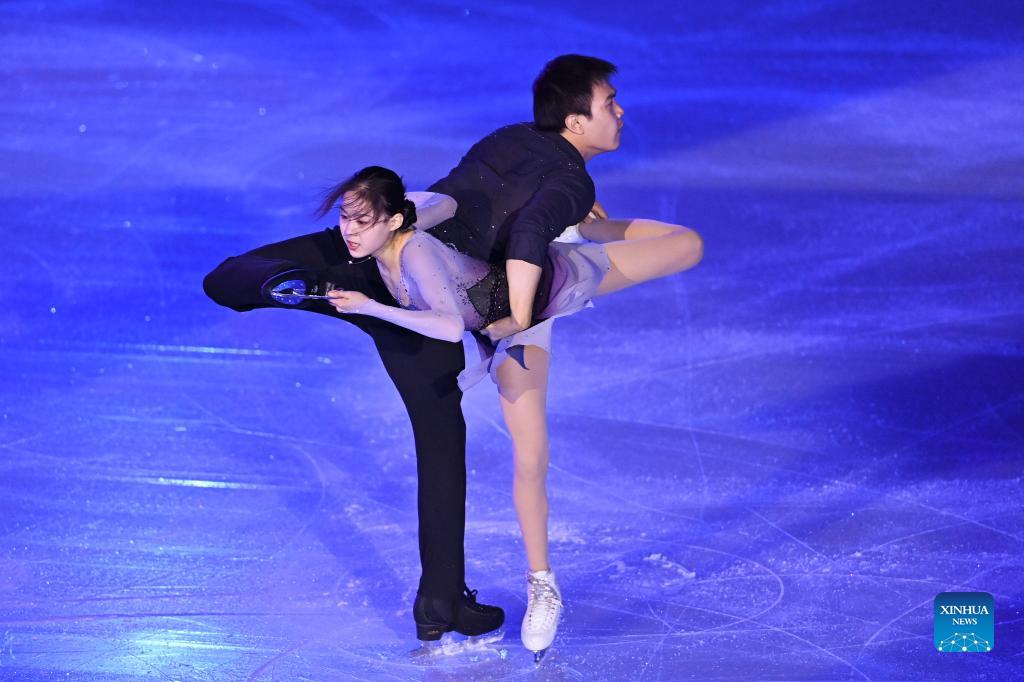Olympic figure skating test in limelight
 0 Comment(s)
0 Comment(s) Print
Print E-mail Xinhua, October 18, 2021
E-mail Xinhua, October 18, 2021
The 2021 Asian Open Figure Skating Trophy, also a test event for Beijing 2022, concluded at the Capital Gymnasium on Saturday after a gala.
The 53-year-old Capital Gymnasium, the venue for figure skating and short track speed skating at next year's Winter Olympics, tested operations such as ice-making, timing and scoring, COVID-19 containment, security and transport during the three-day event.

A total of 31 athletes from nine countries and regions came to Beijing for the figure skating event. Many of them gave thumbs-up to the local organizers.
COVID-19 PREVENTION
Ding Dong, the operation director of the Capital Gymnasium, admitted that the pandemic prevention in the Capital Gymnasium compound was the most severe challenge as it's old and close to the downtown area.
"Foreign athletes, coaches, referees, officials and working staff don't have to quarantine for days before coming to the Capital Gymnasium, but they must provide negative nucleic acid results within 48 hours before entering the closed-loop."
"Everybody in the closed-loop must take nucleic acid tests once a day. Inside the stadium, everyone must wear an N95 mask," Ding added.
Zhao Chengfang, who is in charge of the COVID-19 prevention at the gymnasium, said, "the nucleic acid test is usually taken in the afternoon, and the result comes out in the evening."
"We have a 100-strong special team for the pandemic control," Zhao added. "A positive result will trigger the emergency plan at once, and our team will respond immediately to take the infected person to the hospital and identify close contacts for isolation."
At the entrance to the venue, temperature checks were conducted. In the closed-loop, 75 percent alcohol wipes and hand sanitizers were provided almost everywhere.
Furthermore, based on a three-dimensional computer system, a smart operation center was built to track the flow of people in the venue. A bioaerosol monitoring system in public space can detect the COVID-19 particles in the air and produce related reports in 20 to 30 minutes.
Deniss Vasiljevs from Latvia, who finished fourth in the men's singles at the Asian Open, said he felt safe and comfortable competing here.
"I've never seen a place that everybody observes the COVID-19 prevention rules in such a serious way," Vasiljevs added.
ICE QUALITY AND ATMOSPHERE
Built in 1968, the Capital Gymnasium boasts the first synthetic indoor ice rink in China.
Ding said, "In 1981, the Capital Gymnasium witnessed the promotion of the Chinese national men's ice hockey team to World Group B. But it has not hosted any sports competitions since November 2017 when the ISU Figure Skating Grand Prix China leg was held here. In a sense, for all the Chinese and foreign skaters attending Beijing 2022, this ice rink is unfamiliar."
"And this is the only venue that has to switch between two sports in the middle of a day, which gives us huge stress," he added.
Figure skaters need thicker and softer ice to better support jumps, while short track speed skaters favor thinner and harder ice for speed.
"We have already solved the problem by using carbon dioxide instead of ozone layer-harming Freon as refrigerants in ice-making, and experienced foreign ice-making experts are also in our team," Ding noted.
The 18-year-old Yuma Kagiyama from Japan, who took the men's singles silver at the Stockholm Worlds in March and the gold at the Asian Open on Friday, said, "I feel so good about the ice here, which is conducive to fast and smooth skating."
Kagiyama was echoed by his compatriots Sato Shun, who took the men's silver here, and the women's top two finishers Mai Mihara and Kaori Sakamoto.
Nicole Schott from Germany, who finished sixth in the women's singles, said, "the stadium is very big. I love it."
Jenni Saarinen from Finland, who finished fifth in the women's singles, said, "Everything here makes me excited. I hope I can compete here next year."
Almost all the skaters expressed hopes that spectators as more as possible can come to see their performances at Beijing 2022.
"The test events at the Capital Gymnasium are without spectators this time because of the COVID-19," said Ding.
"After the renovation, the seating capacity of the gymnasium has reduced from 18,000 to 15,000 because we increase the space between seats and provide more space to the handicapped."
HI-TECH ORGANIZATION
In line with the ecology-friendly and hi-tech themes of Beijing 2022, a number of advanced technologies have been applied in the renovation of the Capital Gymnasium.
After 12 months of transformation, the gymnasium has full coverage of 5G signals, and the download bandwidth can reach up to Gigabit, which can support 8K ultra-high-definition live broadcasting, and VR intelligent viewing, according to the technician Wang Tianshi.
"To guarantee the power supply in winter, we have used hydrogen power generation vehicles, electric patrol robot dogs, and a UAV for unmanned inspection in limited space such as underground tunnel," said engineer Li Qingtao.





